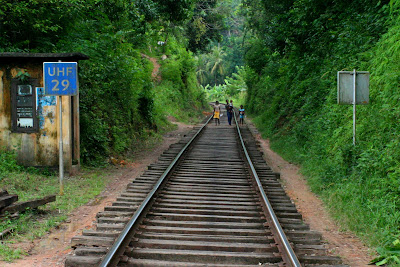We leave a little indignant and head to the train to enjoy the relative luxury of second class, featuring: Seats! Windows! A hole to piss through! The journey is mostly slow, which is great, giving us plenty of time to doze, enjoy the view and take occasional pictures.
 A couple of times we’re approached by people enquiring where we’re going. We take to lying, but get slightly cornered when people try to hurry us off the train at what we claimed to be our stop. After about three hours, though, we arrive at Weligama and jump in a tuk tuk to our nearby hotel. Again, it’s a lesson in luxury, but this time has a bit of soul too: this place is a working cinnamon plantation, owned by a wealthy New York-based ad executive. The tuk tuk driver has no idea where it is, but a phone call later, he has the little three-wheeler scrambling up a winding mud road.
A couple of times we’re approached by people enquiring where we’re going. We take to lying, but get slightly cornered when people try to hurry us off the train at what we claimed to be our stop. After about three hours, though, we arrive at Weligama and jump in a tuk tuk to our nearby hotel. Again, it’s a lesson in luxury, but this time has a bit of soul too: this place is a working cinnamon plantation, owned by a wealthy New York-based ad executive. The tuk tuk driver has no idea where it is, but a phone call later, he has the little three-wheeler scrambling up a winding mud road.We’re placed in the cottage at the summit, overlooking the jungle canopy. Without doubt it’s some of the oddest accommodation I’ve ever stayed in: the setting and décor is heavily colonial, but the place is punctuated with a frankly bizarre collection of modern art. The staff on-hand seem quite bamboozled by our arrival too, even though they claim to have been expecting us.
We talk to a guy who I at first think is the equivalent of a bell boy, but who turns out to be the hotel manager. We tell him we’re here to look for the fabled stilt fishermen of Weligama. He tells us that the fishermen are in fact in nearby Mirssa, which seems believable enough. Despite his advice to get a tuk tuk, we insist on walking there, back down the slippery slopes, past the plantation, through rice paddies and across the train track.
Down here, we’re more of a novelty to the locals: impossibly cute kids shout “hello!” before collapsing into giggles or darting back inside a nearby doorway. The adults wave and grin wonderfully fucked-up smiles at us too. There’s wildlife all around – it’s an amazing place.
 We’ve not long reached the end of the road when we bump into Amal, and even now – over a fortnight later – I’m not sure what I think of him. His story is simple enough: he lost his house in the tsunami, but has a new one thanks to the kindness of Europeans. On the day the disaster struck, he thanks Buddha that his pregnant wife was at her sister’s house inland. He, meanwhile, was on the beach. He says that there wasn’t one wave, but three, each of which was bigger than the last. Not that he saw them all – it was clear what was happening and he was already running for his life. He speaks about all this quite freely, pointing out the remnants of the catastrophe as we walk.
We’ve not long reached the end of the road when we bump into Amal, and even now – over a fortnight later – I’m not sure what I think of him. His story is simple enough: he lost his house in the tsunami, but has a new one thanks to the kindness of Europeans. On the day the disaster struck, he thanks Buddha that his pregnant wife was at her sister’s house inland. He, meanwhile, was on the beach. He says that there wasn’t one wave, but three, each of which was bigger than the last. Not that he saw them all – it was clear what was happening and he was already running for his life. He speaks about all this quite freely, pointing out the remnants of the catastrophe as we walk. He’s nice enough, but it’s so hard to trust him. He never directly asks for money, but just keeps hanging around. It’s hard not to be paranoid: why is he still following us? Why does he ask so many questions about our cameras? Thanks to Bernard, I eventually have to gently tell him to get tae, feeling like a bit of a bastard as I do so.
He’s nice enough, but it’s so hard to trust him. He never directly asks for money, but just keeps hanging around. It’s hard not to be paranoid: why is he still following us? Why does he ask so many questions about our cameras? Thanks to Bernard, I eventually have to gently tell him to get tae, feeling like a bit of a bastard as I do so.We don’t even get to see the fishermen – it turns out that Mirissa just has a standard harbour here. Sure, there are folk fishing, but they’re using big fucking boats, not the weird stilts.
Despondent, we take a long walk down the beach, watch some surfers for a bit, then get caught on the hop by an amazing sunset. It’s a colourful end to a strange day, and no mistake.

